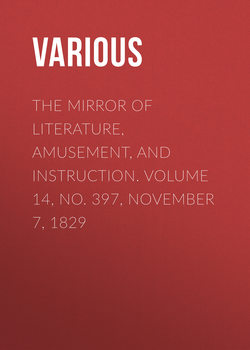Читать книгу The Mirror of Literature, Amusement, and Instruction. Volume 14, No. 397, November 7, 1829 - Various - Страница 3
Burleigh, Northamptonshire
CALCULATING CHILD
Оглавление(Translated from the last number of the Revue Encyclopedique. By a Correspondent.)
(For the Mirror.)
A boy, seven years of age, whose name is Vincent Zuccaro, has excited the public attention at Palermo for some time past. This child, born of poor and uneducated parents, possesses an extraordinary talent for calculation; his mind seizes, as it were, by instinct, all the varied combinations of numbers, which he unravels with equal facility. The various reports which had been spread throughout the city, respecting his talents, appeared so incredible, that a public meeting of literary men was expressly convened, for the purpose of examining his pretensions. The meeting was held on the 30th of January last, at the Academy Del Buon Gusto, and consisted of upwards of four hundred persons, among whom were observed some of the most distinguished literati and influential persons of the city. Two Professors of Mathematics were stationed near the child, to prevent collusion or fraud, and to take minutes of the questions proposed, with the answers returned. A great number of questions were proposed, which Vincent Zuccaro answered with a facility that excited general admiration. We shall only extract two of the most simple, as some of the questions would be hardly intelligible to general readers:
Question 1.—A ship set sail at noon from Naples to Palermo (the distance between the two cities being 180 miles), and sailed at the rate of ten miles an hour; another ship set off at the same time, to sail from Palermo to Naples, at the rate of seven miles per hour: at what time did the ships meet each other, and what was the distance sailed by each? Vincent Zuccaro immediately replied—The first ship sailed 105 15/17 miles; the second, 74 2/17 miles. It was then observed to him, that he had only answered part of the question, and that the hour of meeting had been omitted. He then said this would be 10 10-17 hours after the time of the departure. The child had perceived that this part of the answer was implicitly contained in the former; which he also imagined the examiners perceived as well as himself, and therefore he omitted it.
Question 2.—In three successive attacks upon a town, a quarter of the assailants perished in the first attack, a fifth in the second, and a sixth in the last, when their number was reduced to 138 men. Required the original number? Answer, 360.
Q.—How did you find that number?
A.—If the number had been 60, there would eventually have remained 23; now 23 being the sixth of 138, the assailants were 6 times 60 or 360 at first.
Q.—Why did you suppose the number 60, rather than 50 or 70?
A.—Because neither 50 nor 70 are divisible by 4 or 6.
From these questions and replies, it will be readily understood that the child does not employ the ordinary artifices of mathematicians. Marquess Scriso, who was the first person to discover this singular talent, is about, with several other persons of distinction in the city, to solicit the aid of Government in the education of the child, every one being fully aware of the impropriety of subjecting him to the ordinary mode of education.
